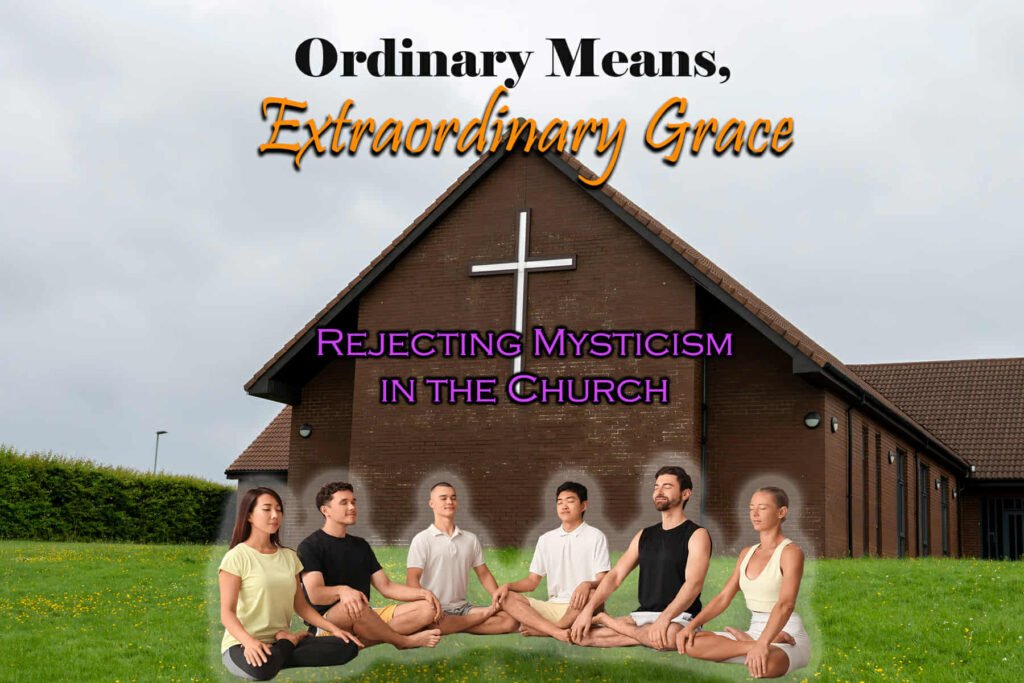⏱️ Estimated Reading Time: 4 min read
Speaking the Truth in Love: How Church Members Can Address Contemplative Spirituality
By Dave Jenkins
Fall 2025 | Theology for Life
Contemplative spirituality has become one of the most popular trends in the Church today. From books and conferences to podcasts and small group studies, many Christians are being invited to explore “new” ways of praying, listening, and seeking God. Often framed in terms of “silence and solitude” or “going deeper with Jesus”, these practices promise intimacy with God. Yet beneath the surface lies something deeply troubling: a move away from the sufficiency of Scripture toward mystical experiences.
As ordinary church members, it can be intimidating to raise concerns. After all, who wants to be labeled divisive or judgmental? But Scripture calls all believers to guard the truth (Jude 3), to test the spirits (1 John 4:1), and to speak the truth in love (Ephesians 4:15). Confronting Contemplative Spirituality is not about winning arguments, but about protecting Christ’s Church and pointing people back to the Lord through the means of grace He has given.
What is Contemplative Spirituality?
Contemplative Spirituality is a broad term that describes practices designed to foster an inner, experiential union with God, often apart from His revealed Word. These practices are rooted in:
- Mysticism: Seeking direct experiences of God through inner voices, visions, or altered states.
- Monastic traditions: Practices like “centering prayer” or repeating mantras that originated in medieval Roman Catholicism.
- Modern adaptations: Popular books and teachers that encourage believers to “empty the mind”, focus on a “sacred word”, or wait in silence for God to speak apart from Scripture.
While often wrapped in biblical language, contemplative practices subtly shift authority away from Scripture and toward personal impressions and feelings. Instead of praying with our Bibles open, shaped by God’s promises and petitions, Contemplative Spirituality often looks more like Eastern meditation dressed in Christian terminology.
Why Contemplative Spirituality is Dangerous
- Replaces God’s voice with impressions: Prioritizes subjective experience over Scripture.
- Devalues doctrine: Treats sound teaching as inferior to mystical encounters.
- Introduces pagan methods: Borrows mantras and mind emptying from Eastern religions.
- Distorts assurance: Roots peace in feelings rather than Christ’s finished work.
Paul warned the Colossians against “self-made religion and asceticism” that appear spiritual but lack power over sin (Colossians 2:23). Contemplative Spirituality is a modern version of the same error.
How Church Members Can Respond
One: Discern Carefully
Test all teachings and practices against God’s Word. Ask, “Does this deepen dependence on Scripture, or substitute technique for truth?”
Two: Approach Humbly
Begin with prayer and humility. “The Lord’s servant must not be quarrelsome but kind to everyone… correcting his opponents with gentleness” (2 Timothy 2:24–25).
Three: Ask Questions, Do Not Assume Motives
Use clarifying questions: “What do you mean by contemplative prayer? How is this different from praying Scripture?”
Four: Point Back to Scripture
Show how prayer, meditation, and communion with God are taught in Scripture. The Psalms model honest, Word-shaped prayer; Jesus taught us to pray (Matthew 6:9–13).
Five: Follow Biblical Accountability
If a practice is being promoted, share concerns with leaders. If it persists, follow Matthew 18 with humility under your church’s oversight.
Six: Speak the Truth in Love
Truth without love crushes. Love without truth deceives. Aim for Christlike grace and clarity (John 1:14).
Returning to the Means of Grace
- The Word preached and read (Romans 10:17).
- Prayer shaped by Scripture (Philippians 4:6–7).
- Fellowship with the saints (Hebrews 10:24–25).
- The sacraments rightly practiced (1 Corinthians 11:23–26).
These ordinary means are God’s appointed instruments to conform us to Christ and build His Church.
Hope for the Church
Only Christ gives true peace and intimacy. He has given us everything needed for life and godliness through His Word (2 Peter 1:3). By speaking the truth in love and clinging to the means of grace, churches can remain rooted in the gospel and flourish in the truth.
This article appears in the Fall 2025 Issue of Theology for Life Magazine, exploring “The Means of Grace.”

Ordinary Means, Extraordinary Grace: Rejecting Mysticism in the Church
Dave Jenkins is happily married to his wife, Sarah. He is a writer, editor, and speaker living in beautiful Southern Oregon. Dave is a lover of Christ, His people, the Church, and sound theology. He serves as the Executive Director of Servants of Grace Ministries, the Executive Editor of Theology for Life Magazine, the Host and Producer of Equipping You in Grace Podcast, and is a contributor to and producer of Contending for the Word. He is the author of The Word Explored: The Problem of Biblical Illiteracy and What To Do About It (House to House, 2021), The Word Matters: Defending Biblical Authority Against the Spirit of the Age (G3 Press, 2022), and Contentment: The Journey of a Lifetime (Theology for Life, 2024). You can find him on Facebook, Twitter, Instagram, Youtube, or read his newsletter. Dave loves to spend time with his wife, going to movies, eating at a nice restaurant, or going out for a round of golf with a good friend. He is also a voracious reader, in particular of Reformed theology, and the Puritans. You will often find him when he’s not busy with ministry reading a pile of the latest books from a wide variety of Christian publishers. Dave received his M.A.R. and M.Div through Liberty Baptist Theological Seminary.




